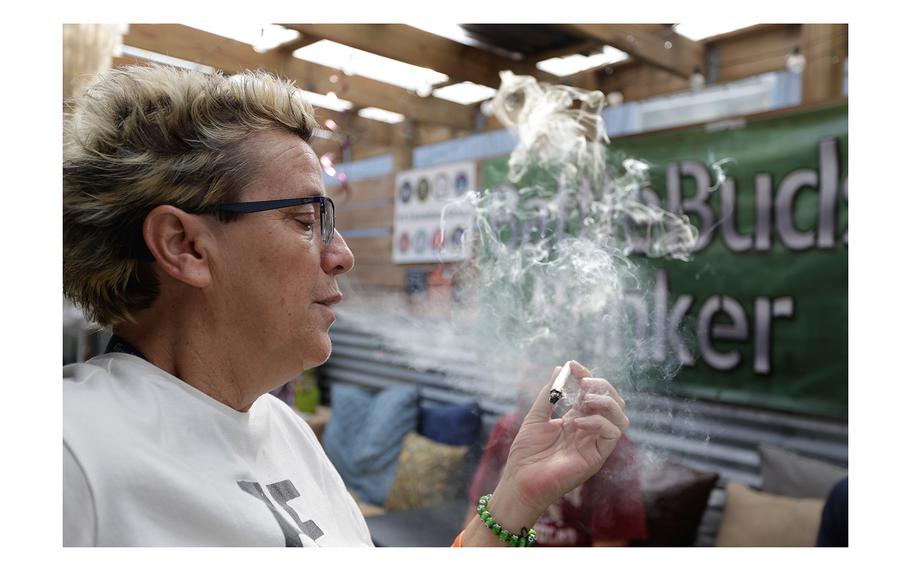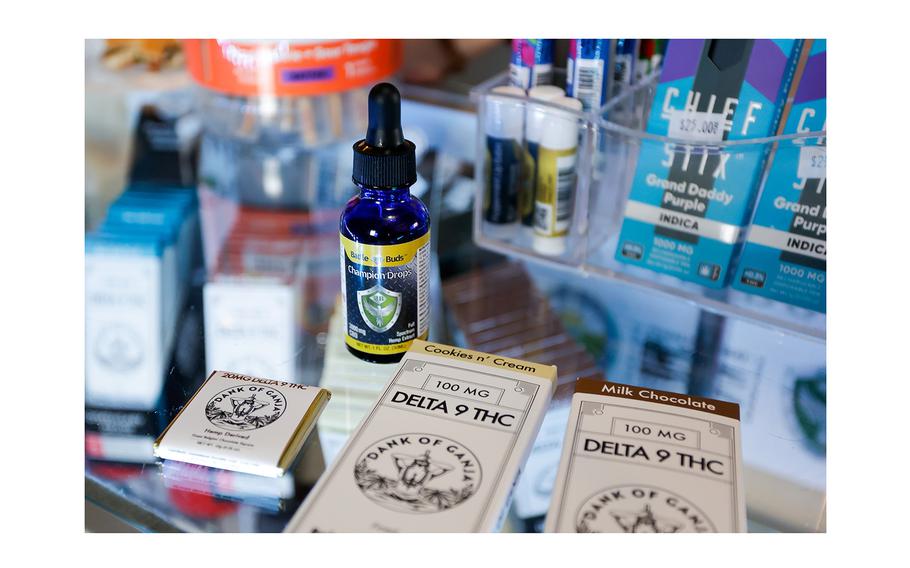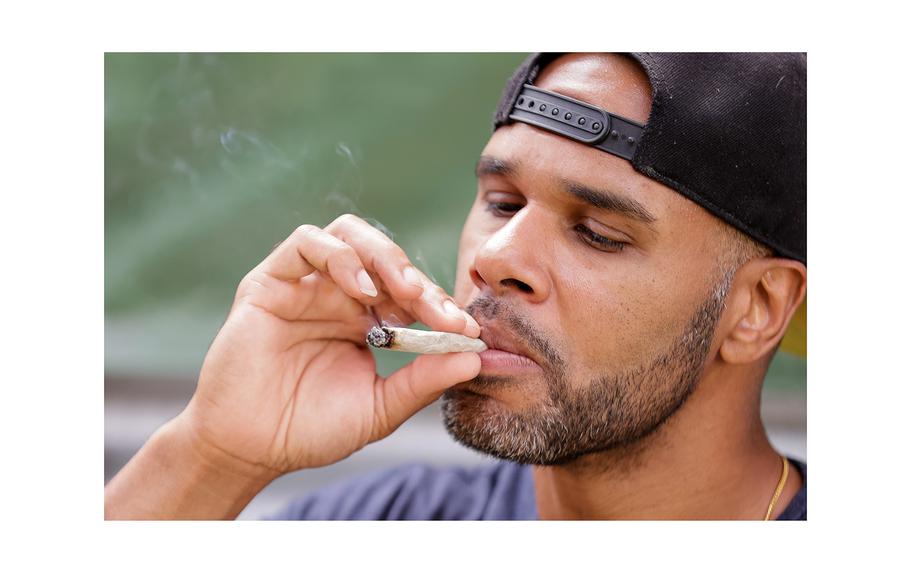
Tammy Long, a 26-year Navy veteran and co-owner of BattleBuds, smokes a hemp product on March 13, 2024. in Tampa. “Some of us don’t want to get high — we want to get better. And we don’t want to go back on pills,” she said. (Luis Santana/TNS)
TAMPA — Tammy Long left rehab looking for a way to stay off the powerful painkiller hydrocodone.
A 26-year Navy veteran, Long had snorted the opioid and the stimulant Ritalin, both prescribed by the U.S. Department of Veterans Affairs, trying to ease a range of ailments after she retired from the military, she said.
She suffered a traumatic brain injury in Iraq when she fell off a troop truck and hit her head in 2003. She’s also grappled with chronic pain, migraines and post-traumatic stress.
“My body was just so broken,” said Long, 58, who retired in 2010 as a senior chief Navy counselor and later hurt her back while working as a property manager.
So she tried something new. Long began using medical marijuana and hemp extracts containing CBD and delta-8 THC, a chemical compound from the cannabis plant that affects how the brain functions.
And it worked. Long credits this mixture for quelling her pain and keeping her off the opioids and stimulants.
But Long and other veterans who rely on hemp extract may find themselves scrambling for alternatives. Access could soon be curtailed if Gov. Ron DeSantis signs a bill limiting the types of products that shops can sell.
Even though the products are not federally approved to treat health conditions, Long and others consider them over-the-counter medicine, using powder, gummies and even honey infused with cannabis ingredients to soothe problems like tremors or insomnia. They also say hemp extract is easier to purchase than medical marijuana, which requires a doctor’s approval.
“Some of us don’t want to get high — we want to get better. And we don’t want to go back on pills,” said Long, who four years ago opened a hemp shop in Tampa called BattleBuds. It averages up to 40 customers a month who are veterans.
She said dozens of veterans have urged DeSantis to veto the legislation.
“It’s very unfair,” said Pablo Bicca, a Marine Corps veteran in Wesley Chapel who hosts events at BattleBuds. “They’re making it so difficult for these farmers and businesses … to provide plants and medicine for patients.”
It’s unclear how many veterans across Florida use hemp products to address health issues. The Tampa Bay Times was unable to find data tracking the issue, but Bicca said he anecdotally knows of scores of former military members who do so.

Chocolate bars containing delta-9 THC and a bottle of BattleBuds CBD tincture, Champion Drops, at BattleBuds on March 13, 2024, in Tampa. (Luis Santana/TNS)
The bill awaiting the governor’s signature would ban stores from selling delta-8 THC and would further restrict how much delta-9 THC, marijuana’s best-known and primary mind-altering ingredient, is allowed in hemp extract. The ban would extend to hundreds of shops like Long’s. Business owners worry that Florida’s booming multibillion-dollar hemp industry could collapse if the bill takes effect Oct. 1, forcing companies to leave the state or shut down. Products would be taken off shelves, but some retailers say Floridians would still be able to order them online from elsewhere in the country.
The state has separate regulations for medical marijuana and hemp extract. Medical marijuana users need a physician’s approval to buy products from a dispensary. Hemp users don’t need a referral to visit smoke shops, gas stations and other retailers.
The hemp industry could take a financial hit in November, too. That’s if Florida voters approve a proposed constitutional amendment legalizing recreational marijuana use for those 21 and older. The ballot measure would, at least initially, give the state’s 25 licensed medical marijuana companies the exclusive rights to sell recreational cannabis. Florida has more than 878,000 medical marijuana patients.
A DeSantis spokesperson in an email said the governor will review the hemp bill once it’s delivered to his office.
Concerns about people self-medicating
The U.S. Food and Drug Administration in a statement to the Times said cannabis products sold at smoke shops, convenience stores, gas stations and online have not been proven safe or effective. The agency has previously received 104 reports of delta-8 THC being linked to vomiting, anxiety, dizziness, confusion and loss of consciousness, among other symptoms. Delta-8 THC is similar to delta-9 THC, with the ability to affect someone’s mood and behavior, but is considered less potent.
While delta-8 THC products became widely available after Congress passed the 2018 Farm Bill defining and legalizing hemp at the national level, they are banned in 17 states, according to CBD Oracle, a consumer research company focused on cannabis.
As hemp products grow more popular in Florida, their risks are becoming better known. Calls about exposures to hemp extract have surged in recent years, rising from eight cases in 2016 to more than 1,600 last year, according to data from Florida’s poison control centers. Almost half of the cases were children in 2023. But no deaths were recorded, Justin Arnold, medical director of the Tampa center, said in an email.
The Times asked the House and Senate bill sponsors about veterans’ frustrations with the legislation. But Rep. Tommy Gregory, R-Lakewood Ranch, and Sen. Colleen Burton, R-Lakeland, couldn’t be reached by phone call, text or email.
During a February committee meeting, Gregory expressed concern about products having packaging attractive to kids and Floridians self-medicating with them.
“When you go to those stores, who’s giving you the advice on what milligrams you should take?” Gregory said. “And what qualifications do they have to be making that determination?”
“I was a zombie”
Local veterans interviewed by the Times say hemp extract, which can only be legally sold to those 21 and up, is a gentler alternative to prescription drugs — and can supplement their medical marijuana allotments.
John “Drew” Reinhart, a Navy veteran who was a cook on an aircraft carrier during the Iraq War, left the military in 2007 suffering from insomnia, chronic pain and migraines caused by tinnitus, a ringing noise in the head, he said.
The Department of Veterans Affairs treated Reinhart, 40, by prescribing an array of drugs, including the painkillers morphine and tramadol, he said.
“I was a zombie,” said Reinhart, who grew up in Tampa. “The side effects were screwing me up. … I wasn’t a healthy person.”
Reinhart, whose first job was helping a local beekeeper, said he thought a business selling cannabis-infused honey would be profitable. After learning of the state’s budding hemp industry in 2020, he launched a company called D’z B’z Inc.
“If you want to get high, go get some flower, pack a bowl,” he said. “My products are meant to help with pain.”
He said he made CBD honey to get himself off his medications, then began to sell jars of it for $50. He hopes veterans hospitals will eventually use it.
A Department of Veterans Affairs spokesperson in an email said patients shouldn’t stop taking their prescriptions without talking to their health care provider.
Reinhart also began selling jars of honey with 360 milligrams of delta-9 THC, which he said he sometimes uses to fall asleep. These types of products would be barred under the legislation.
If the bill is signed, Reinhart said he’s considering moving his business to South Carolina.

Marine Corps veteran Pablo Bicca smokes a hemp product at BattleBuds on March 13, 2024, in Tampa. “We’re not drug dealers,” he said. “We’re not criminals. We’re just people looking for relief and looking for (an) alternative to pharmaceuticals.” (Luis Santana/TNS)
Bicca, the Marine Corps veteran, experienced suicidal thoughts and post-traumatic stress after serving as an infantry rifleman during the Iraq War. He fought in the Battle of An-Nasiriyah, during which dozens of U.S. soldiers were killed.
While living in New York in 2012, Bicca said he began smoking marijuana to substitute Department of Veterans Affairs antidepressants that led to weight gain. He got a medical marijuana card after moving to Florida but found himself quickly reaching his allotment.
Bicca, 43, turned to the hemp industry for extra relief, and now spends up to $400 each month on its offerings. He eats delta-8 THC and delta-9 THC gummies from hhemp.co, an Oregon company that sells products across the country. He said he takes them around noon to alleviate ankle and knee pain.
They’d be prohibited if DeSantis signs the bill, Bicca said. The company didn’t respond to phone messages.
Leaving for Tennessee
Long, a Tampa native, returned here in 2018 after spending time in a California outpatient clinic. She opened the BattleBuds shop with her cousin in 2020.
Now, she plans to move to Tennessee in the coming months — a state where she said she can keep using a powdered blend of CBD and delta-8 THC that she mixes into her morning coffee.
She wants to open another BattleBuds there and take online orders for hemp extract from Floridians. Her Tampa store, which generated about $32,000 last year, would lose 75% of its inventory if the bill takes effect, she said.
“We’re not drug dealers,” Bicca said. “We’re not criminals. We’re just people looking for relief and looking for (an) alternative to pharmaceuticals.”
©2024 Tampa Bay Times.
Visit tampabay.com
Distributed by Tribune Content Agency, LLC.